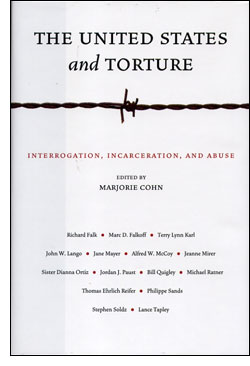 |
 |
 Marjorie Cohn
Marjorie Cohn
The United States and Torture: Interrogation, Incarceration, and Abuse
Reviewed by: Rick Kleffel © 2011
NYU Press
US First Edition, Hardcover
ISBN 978-0-814-71732-5
Publication Date: 01-12-2011
342 pages, £9 ; $39.00
Date Reviewed: 02-21-2011
Index:
Non-Fiction
Understanding is a pleasure — but it may not feel that way. It's necessary, it's important, it is helpful to our everyday lives to have a clear view of how the world around us works. Being able to grasp how world politics filter down into the lives of others enables us to act with deliberation in our own lives. We need to acquire the knowledge, often unpleasant, that will help us make decisions that will, we hope, make our children's, if not our own lives, safer and more productive. Getting that information into our minds is the real trick.
The most common means these days is to watch television. But even in those arenas not larded with advertising that distracts from any coherent message that one might hope to comprehend, the very nature of the medium discourages engagement. The difference between being a viewer and a reader is that between a recipient and a participant. When you read, you build the understanding one word at a time. It makes a significant difference in what information your receive and your ability to integrate it into your everyday life.
'The United States and Torture: Interrogation, Incarceration and Abuse' (NYU Press ; January 12, 2011 ; $39), edited by Marjorie Cohn, is an essential reading experience if you hope to have a firm grasp on how the policies of those you elect here in the United States will spill out around the rest of the world. Cohn, a professor at the Thomas Jefferson School of Law, decided to gather a psychologist, a historian, a political scientist, a philosopher, a sociologist, two journalists, and eight lawyers to write about torture as a policy of the government of the United States in the wake of the terrorist attacks of September 11, 2001. With a passionate preface by Sister Diana Ortiz, who was tortured in Guatemala in 1987 by a government supported by the United States, and an introduction by Cohn herself, 'The United States and Torture,' becomes a disturbing work of non-fiction dystopian horror. It reads rather like an imaginary reference work that George Orwell might have created to give the world of his seminal novel '1984' veracity. Unfortunately, this is no work of the imagination. Welcome to your world.
Cohn's collection is divided into three sections. "The History and Character of Torture" demonstrates that though we brought things out into the open in the 21st century, the US has a long and dishonorable history in the realm. From the CIA's pursuit of psychological torture during the Cold War to the notorious "School of the Americas," our government has not shied away from the unthinkable. John Lango, the philosopher, analyzes "Fundamental Human Rights and the Coercive Interrogation of Terrorists in an Extreme Emergency," a fascinating thought experiment based around the old chestnut, "What if we think he knows where the nuke is hidden?" It's not for the faint of heart.
Part II looks at "Torture and Cruel Treatment of Prisoners in US Custody." Here's where the book becomes incredibly timely. The recent fall of the Egyptian government under Hosni Mubarek may seemingly throw the easy prospect of "extraordinary rendition" to Egypt into doubt, but the state of emergency that allowed torture in Egypt remains in force. By virtue of having read Mayer's article, the reader is able to put together a complicated and contradictory picture of what is happening, and what may happen. It's very interesting.
Part III, "Accountability for Torture" looks at the legal and moral implications of our policy of committing, abetting and contracting torture. This is a very complicated issue with implications all over the political spectrum that resist easy summation. Cohn's contributors, from a variety of disciplines, break it down but resist turning messy real-world actions into luridly simple conclusions.
The pleasure of reading 'The United States and Torture' is the "aha" moment, the feeling of revelation that comes when a reader arrives at a clear understanding of a murky situation. "Murky" is something of an understatement with regards to torture, but when we are confronted with alarmingly violent and arguably despicable actions taken on our behalf, as citizens, then understatement is the best path to understanding. Marjorie Cohn and her contributors will help the reader achieve a level of clarity about subjects that are difficult to think about, let alone analyze. It's an achievement that should not go unrecognized or unnoticed. You won't, you cannot see this on the television. 'The United States and Torture' is an argument for many things, among them reading itself.
|
 |
|
|
 |
| |
Review Archive
All Reviews alphabetized by author.
General Fiction
Non-Genre, general fiction and literature.
Horror
Supernatural fiction, supernatural horror and non-supernatural horror.
Science Fiction
Science fiction, science fantasy, speculative fiction, alternate history.
Fantasy
Fantasy, surrealism and magic realism.
Mystery
Crime, thrillers, mystery, suspense.
Non-Fiction
Non-Fiction, True Crime, Forteana, Reference.
Poetry
|
|
 |
|




